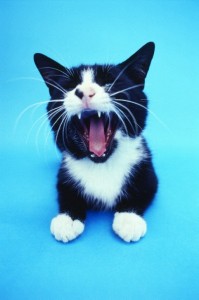Fat
 Cats need a moderate amount of fat in their diet for energy, essential fatty acids, healthy skin and coats, and the absorption of fat-soluble vitamins like Vitamin A, D, E and K. In addition, fat makes food taste better for cats, which in turn leads to happier felines.
Cats need a moderate amount of fat in their diet for energy, essential fatty acids, healthy skin and coats, and the absorption of fat-soluble vitamins like Vitamin A, D, E and K. In addition, fat makes food taste better for cats, which in turn leads to happier felines.
A general rule of thumb is that kittens and cats with high energy levels can handle a moderate amount of fat in their diet, whereas overweight or lethargic cats should consume a low-fat diet.
Despite the health benefits of fat and the delicious taste, there is a danger in feeding cats too much fat. Fat contains an incredible amount of calories, and a high-fat diet can lead to unhealthy weight gain or obesity. On the other hand, a cat that is not consuming enough fatty acids may suffer from developmental problems, itchy and dry skin, or a dull coat. It is important to find the right balance of fat for each particular cat. A general rule of thumb is that kittens and cats with high energy levels can handle a moderate amount of fat in their diet, whereas overweight or lethargic cats should consume a low-fat diet.
High quality cat food brands will contain essential fatty acids derived from natural sources such as poultry fat. The use of lard, tallow, or hydrogenated coconut oil as a source of fat is less ideal, as these can contain many calories and may not be digested easily by cats. Storing cat food in a hot or humid environment can cause the fat in the food to go rancid, which breaks down the essential fatty acids.
Carbohydrates
There is great debate over whether cats should consume carbohydrates. Some believe that carbohydrates are completely unnecessary for a cat’s diet. Others believe that they can supply energy and fiber. Many veterinarians recommend feeding cats a low-carbohydrate diet.
It is better to stick to a high-protein, low-carbohydrate diet for optimal health benefits.
Carbohydrates are made up of sugars, starches, and fibers, and are found mainly in grains and plants. Unlike dogs, cats cannot easily process carbohydrates as they lack the enzymes to do so. Although cats can get some necessary sugars and fibers from carbohydrates, carbohydrates should only make up about 3-5% of a cat’s diet.
Many cat foods contain small amounts of carbohydrates including corn, rice, wheat, soy, and sorghum. These are fine for cats to eat in small amounts. However, some foods use carbohydrates as cheap fillers, and these ingredients can appear in large amounts. A cat that consumes a diet high in carbohydrates could develop illnesses such as diabetes, obesity, or Irritable Bowel Syndrome. It is better to stick to a high-protein, low-carbohydrate diet for optimal health benefits.